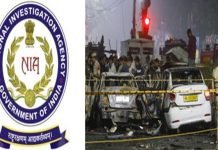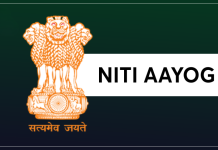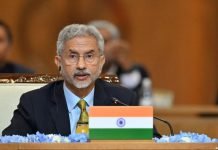
New Delhi: Atal Bihari Vajpayee, former prime minister and BJP stalwart, passed away on Thursday. He was 93. Vajpayee was admitted to the All India Institute of Medical Sciences in June. Vajpayee, who had been ailing for long, retreated from active public life over the last decade following the deterioration of his health and remained restricted to his residence.
In a medical bulletin, AIIMS said: “It is with profound grief that we inform about the sad demise of former prime minister of India, Shri Atal Bihari Vajpayee at 5.05 pm on 16.08.2018. Shri Vajpayee was admitted in AIIMS on 11.06.2018 and was stable in the last 9 weeks under the care of a team of AIIMS doctors. Unfortunately his condition deteriorated over the last 36 hours and he was put on life support systems. Despite the best of efforts, we have lost him today. We join the Nation in deeply mourning this great loss.”
A host of leaders including Prime Minister Narendra Modi visited the BJP patriarch at AIIMS. Modi met the doctors and enquired about the well-being of Vajpayee. He also met his family members, according to an official statement.
BJP veteran L K Advani, Home Minister Rajnath Singh, BJP president Amit Shah, Congress chief Rahul Gandhi, Health Minister J P Nadda and Environment Minister Harsh Vardhan were among those who paid a visit to the ailing leader.
Born in 1924 in Gwalior, Vajpayee became the first non-Indian National Congress PM to serve a full five-year term. He was first exposed to the political sphere during the Quit India movement in 1942. Within five years since then, he became a full-time RSS Pracharak and, due to his oratory skills, he soon became the face of the Jana Sangh (which is today known as the BJP).
Vajpayee was arrested between 1975 to 1977 during the Emergency imposed by the then Prime Minister Indira Gandhi. In 1977, Vajpayee became the external affairs minister in former PM Moraji Desai’s Cabinet. Even in those days, he was the party’s star speaker.
His first stint as Prime Minister lasted only for 16 days (from May 16-31, 1996) and then again from March 19, 1998 to May 13, 2004.
Vajpayee, whose parliamentary experience spanned over four decades, had been a Member of Parliament since 1957. He was elected to the Lok Sabha ten times, and twice to the Rajya Sabha.
In late 1998 and early 1999, ex-PM Vajpayee tried to mend differences with Pakistan by pushing for a full-scale diplomatic peace process with its neighbour. With the historic inauguration of the Delhi-Lahore bus service in February 1999, Vajpayee initiated a new peace process aimed towards permanently resolving the Kashmir dispute and other conflicts with Pakistan.
The 1999 Kargil war proved to be vital for the Vajpayee-led government. Pakistan troops infiltrated into India’s territory in Kashmir valley and captured the control of unmanned border posts in 1999. Vajpayee took a firm stand, leading India to victory in Kargil and forcing Pakistan to withdraw their troops from India’s territory. In 2002, a US diplomat revealed that Vajpayee stood firm on India’s demand for unconditional withdrawal of Pakistani troops and his then counterpart Nawaz Sharif buckled to Washington’s diktat. In spite of the war, Vajpayee also made efforts to boost the bilateral ties with Pakistan.
A voracious reader, Vajpayee was widely known and respected for his love for poetry and as an eloquent speaker. He was conferred Padma Vibhushan in 1992 in recognition of his services to the nation. He was subsequently awarded the Bharat Ratna, India’s highest civilian award, in 2015.
Follow Us
The Kashmir Pulse is now on Google News. Subscribe our Telegram channel and Follow our WhatsApp channel for timely news updates!










